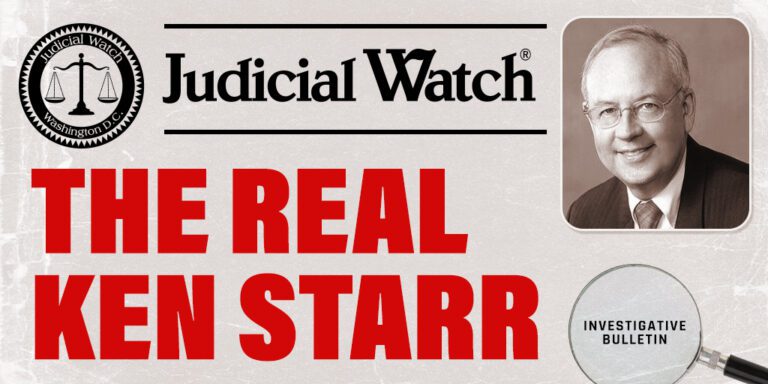

The Real Ken Starr


Funeral services for former Whitewater independent counsel Ken Starr will be held Saturday in Waco, Texas. Starr died September 13 in Houston. He was 76, a son of Texas. Coverage of his passing was entirely predictable: the media, the Left, and the academy vilified him in death precisely as they had vilified him in life.
A representative story, from Politico, sets the tone. It’s headlined “Ken Starr: the Man who Created the Lewinsky Scandal.” The subhead: “His colorless exterior masked an inner zeal that left an indelible mark on U.S. politics.” Writes David Greenberg, a professor of history at Rutgers University: Starr was “a motive force” behind the Lewinsky Affair, “the man who turned what should have been a dispassionate legal inquiry into a frenzied political inquisition.”
You get the idea. And the truth is, the smear, engineered by the Clinton White House, was wildly successful. The popular image, the cultural shorthand, the “Ken Starr” trope—to anyone who lived through the 1990s, the first picture that comes to mind, even today, is Starr the zealot, the humorless prig, the Javert bent on destroying Jean Valjean.
But to anyone who knew Ken Starr—and I knew him pretty well—the popular image is pure character assassination. Politics is a rough business and in Washington, as another casualty of the Clinton era, Vincent Foster, once said, “ruining people is considered sport.” Ken Starr knew that. He was no babe in the Washington woods. And yet, at least in the early years of the Whitewater probe, Starr often seemed taken aback by the level of vitriol coming from the White House and its allies, and he was always on the lookout for the better angels in the nature of Bill and Hillary Clinton. Maybe this time they would cooperate, maybe this time they would tell the truth, produce the documents, stop the stonewall. But it was not to be. Mrs. Clinton, with her continual evasions and obfuscations, her repeated failures of memory, her missing billing records, was a particular disappointment.
Monica Lewinsky came late to the Whitewater investigation, when the independent counsel had scored some important wins and suffered some big losses. After more than four years of high-pressure prosecutions, Starr was looking to wrap it up. But once the facts began to emerge in the Lewinsky case, he did not—he could not—turn away.
Start with—to summon a phrase from a later era—start with a #MeToo fact: the president of the United States had coerced—is there any other word for it?—a 24-year-old intern, Ms. Lewinsky, into nine sexual encounters, including oral sex.
Add the legal fact: in a sexual harassment lawsuit brought by a former Arkansas state employee, Paula Jones, President Clinton had lied under oath, denying that he had sexual relations with Ms. Lewinsky.
Add the evidentiary fact: a former White House employee brought Starr prosecutors tape recordings of Lewinsky discussing her affair with the president, including illegal attempts to cover it up.
Starr stayed silent about the Whitewater probe for decades. But in 2018, he published a memoir, “Contempt: A Memoir of the Clinton Investigation.” In it, he wrote, “I deeply regret that I took on the Lewinsky phase of the investigation. But at the same time, as I still see it 20 years later, there was no practical alternative to my doing so.”
President Clinton was impeached in the House of Representatives in 1998 for lying under oath and obstructing justice, only the second impeachment of a president in U.S. history. He was acquitted at trial in the Senate. A federal judge later found him in contempt of court for giving “intentionally false testimony.” And in a deal to avoid prosecution after leaving the presidency, Clinton agreed to surrender his law license for five years and pay a $25,000 fine for giving false testimony in the Jones case.
Back in Arkansas, the Whitewater investigation—a sprawling federal probe centered around the Clintons’ relationship with the owners of a corrupt savings and loan—Starr succeeded in a sweeping corruption cleanup. He obtained fourteen convictions, including from Mr. Clinton’s successor as governor, Jim Guy Tucker, S&L owners James and Susan McDougal, and Mrs. Clinton’s former law firm partner, Webster Hubbell, who had come to Washington with the Clintons to serve as associate attorney general.
But the Clintons themselves proved elusive. The Starr team, after much deliberation, concluded they did not have enough evidence to convince a jury beyond a reasonable doubt that Mrs. Clinton was guilty of financial crimes and obstruction of justice in the Whitewater affair. (In 2016, Judicial Watch released 246 pages of previously undisclosed Office of Independent Counsel internal memos revealing the possible criminal charges against Hillary Clinton and Webster Hubbell.) The independent counsel drew up a draft indictment of Mrs. Clinton—a document that remains under seal in the National Archives, despite years of Judicial Watch legal actions to bring it to light. The Clinton Whitewater case was never brought to trial.
To prosecutors, there were six key insiders who could provide significant information about allegations of corruption against the Clintons regarding the Whitewater land deal (a McDougal-Clinton partnership connected to the McDougals’ corrupt Madison Guaranty S&L); billing records under subpoena that had mysteriously vanished from Mrs. Clinton’s law firm; and other apparent illegal loans and payoffs.
The six key insiders were Mr. and Mrs. Clinton, James and Susan McDougal, Webster Hubbell, and Vincent Foster.
All fell silent.
The Clintons refused to talk. Hubbell, facing jail time, promised cooperation in exchange for a reduced sentence, but as funds from allies of the Clintons flowed to the beleaguered Arkansas insider, his cooperation with federal authorities dried up. Susan McDougal defiantly refused to testify before a grand jury and served a lengthy jail sentence for contempt; later, President Clinton pardoned her. James McDougal, convicted for corruption in a Starr prosecution, agreed to cooperate with the independent counsel, but died in prison before he could make good on his promise. Vincent Foster, another Hillary Clinton law firm partner and deputy White House counsel, died by his own hand shortly after coming to Washington with the Clintons.
The Starr team played a key role in answering questions about the Foster death, as well as the Travel Office affair, and “Filegate.”
Foster’s body was discovered in a small federal park near Washington with a gunshot wound to the head in July, 1993. His death touched off a storm of controversy in Washington. News soon emerged that files had been removed from Foster’s White House office by Clinton loyalists. Questions swirled. Had Foster really committed suicide, or was he murdered?
Initial inquiries by the Park Police and Robert Fiske—a federal prosecutor who led the Whitewater probe before Starr’s appointment—were deemed unsatisfactory by the media and Congress. Starr took over the death probe, brought in the FBI and outside forensic experts, and eventually issued a painstakingly detailed report addressing all the issues surrounding the Foster suicide, largely putting the matter to rest.
In the Travel Office affair, Starr investigated allegations that federal crimes were committed related to the firings, apparently at Mrs. Clinton’s behest, of the seven-member White House team that handled bookings for presidential-related travel. Mrs. Clinton wanted the Travel Office team replaced with Clinton cronies. The head of the Travel Office, Billy Dale, was accused of misdeeds and indicted by a federal grand jury. He was swiftly acquitted at trial. Starr’s conclusion? The behavior by the White House in the Travel Office affair was “mean-spirited” but “did not amount to a federal crime,” he wrote in his memoir. But it “certainly revealed Hillary’s character and her contempt for regular order.”
“Filegate” centered around the Clintons’ inappropriate requisition of FBI files, supposedly for background checks of potential incoming personnel. “Forbidden files from the FBI’s vaults had landed” in a White House personnel office, Starr wrote. Somebody should have smelled a rat and raised questions. No one did. Extensive forensic analysis showed that neither of the Clintons had handled the FBI files. Filegate, Starr wrote, revealed that the White House was “cavalier in its approach to staffing a hypersensitive position within the Executive Office complex.” But, he noted, “exercising poor judgment…is not a crime.”
Starr had come a long way. His father was a hardscrabble Church of Christ minister and part-time barber, his mother a homemaker. He grew up in the remote north Texas town of Vernon, but was not destined to stay. Brilliant, outgoing, he made his way to law school at Duke, and to a clerkship with Chief Justice Warren Burger. He rose fast, moving from private practice in Los Angeles to serve as aide to William French Smith, who had been named attorney general at the Reagan Justice Department. In 1983, at age 37, Starr was appointed to the prestigious U.S. Court of Appeals for the District of Columbia. He made no secret of his ambition: a seat on the Supreme Court—not out of reach for an ambitious young conservative who had landed on the DC circuit court. In 1989, he accepted President George Bush’s offer to become solicitor general. In 1993, with the Bush loss to Bill Clinton, he returned to private practice.
Then the Special Division of the Court of Appeals came calling, asking if he would accept appointment as independent counsel in the Whitewater matter. After a few days of consideration, he accepted the offer.
“Ever the optimist,” Starr wrote, “I anticipated taking six months to wrap things up. From the outside, the Whitewater case looked like nothing more than a failed land deal in Arkansas.”
Of course it turned out to be much more than that. The months turned into years, the attacks grew, the controversies multiplied. Whitewater, Foster, Travel Office, Filegate, Lewinsky. Increasingly beleaguered, in conversations and statements Starr continually returned to notions of duty and the rule of law. These were no longer abstract notions, but life principles—his Whitewater destiny. It came at considerable cost. He stepped down as independent counsel in 1999. Gone was any chance for a seat on the Supreme Court. Gone was any chance to return to the DC circuit court, a job he loved.
Life took a different path, not always easy. In 2016, he stepped down as president and chancellor of Baylor University in Texas when a sexual assault scandal swept the school. “The captain goes down with the ship,” he said at the time, though he was not personally implicated in any wrongdoing. His resignation, he said, was “a matter of conscience.”
“He was a very courageous man,” recalled Hickman Ewing Jr., the famed Memphis federal prosecutor who served as Starr’s deputy independent counsel. Ewing, like Starr, is a man of strong Christian faith. During the Whitewater probe, “Starr often had his faith ridiculed,” Ewing said, “it was not pleasant,” but it did not change his essential nature. “He liked to call himself ‘a joyful optimist,’ and I think that’s correct,” Ewing said. “He was a man, in the words of Paul’s Epistle to the Galatians, steeped in ‘the Fruit of the Spirit: love, joy, peace, patience, kindness, goodness, faithfulness, gentleness, self-control.’ That was the real Ken Starr.”
***
Micah Morrison is chief investigative reporter for Judicial Watch. Follow him on Twitter @micah_morrison. Tips: [email protected]
Investigative Bulletin is published by Judicial Watch. Reprints and media inquiries: [email protected]














